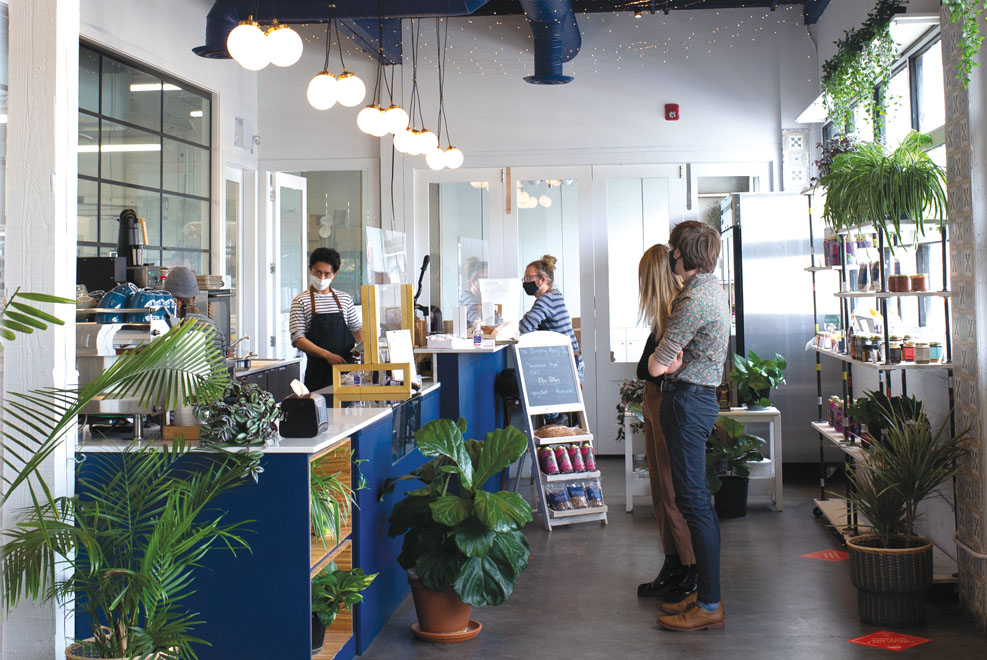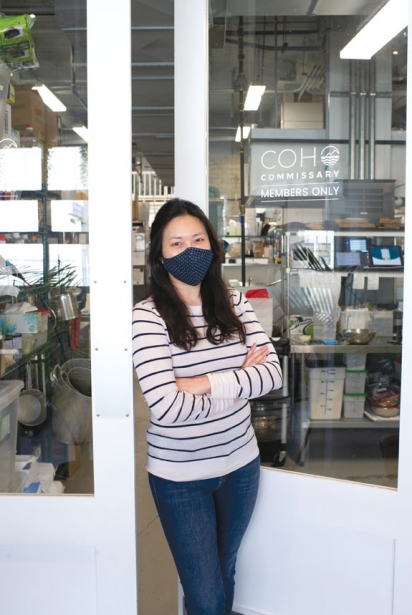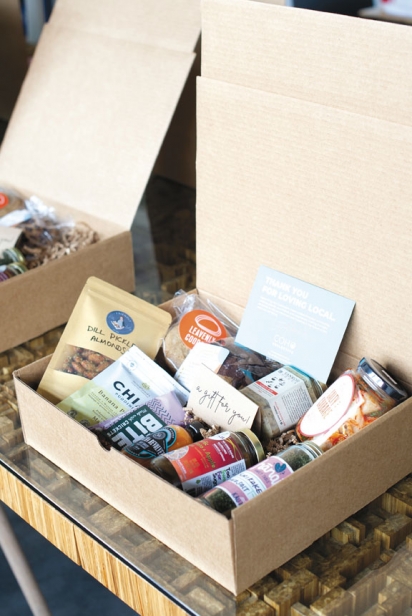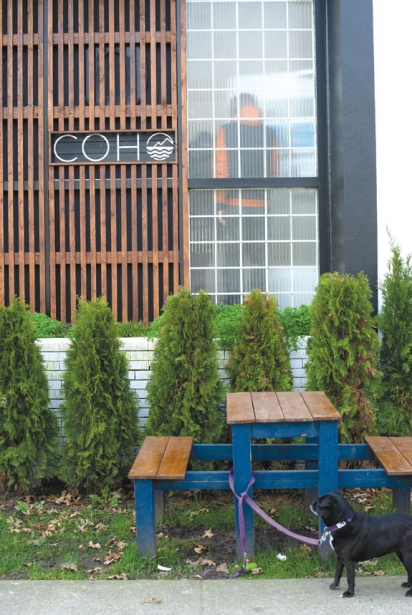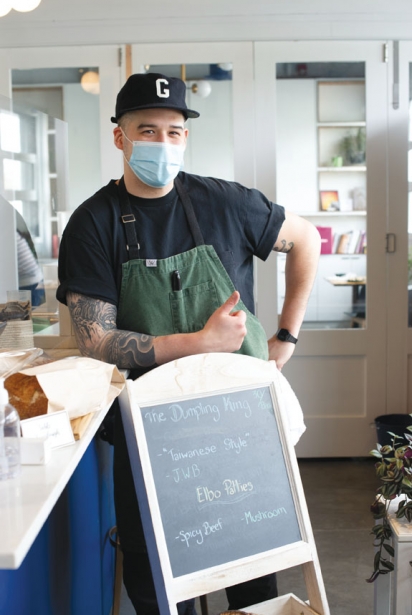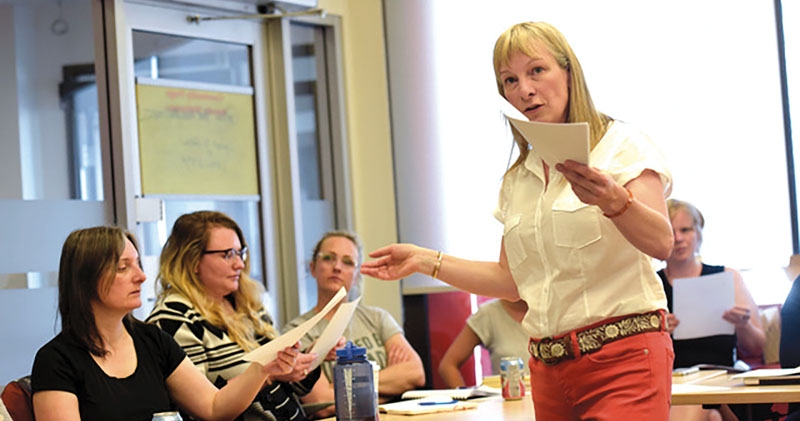Food Hubs
When Andrea Gray-Grant opened her food manufac- turing plant, she expected to be successful. Why wouldn’t she? Up to that point, she’d had a stellar career in the food industry that landed her the role of VP of sales and marketing at Happy Planet. Striking out on her own was just a natural next step in the evolution of her career.
It didn’t take long before Gray-Grant found herself buried in the day-to-day operations. She eventually got help, and there were good years and bad, but within five years she shut the doors.
“It was probably the most humiliating thing I’d been through, and part of that was because I didn’t know about failure,” Gray- Grant says. “To me, failure was really bad, but especially because it was a failure everybody knew about.”
For six months, Gray-Grant retreated, but when she looked up she realized that her failure gave her something of value to other food producers — intimate insight into the dos and don’ts of the food industry.
“I started consulting because even though I had a background in the industry, I had so many issues, so I wondered how these other people who aren’t as well connected were going to make a go of it?” she says. “I made up my mind that it would be better for me to support people and their success.”
There are nearly 3,000 food and beverage producers in B.C. that generate $10.5 billion in sales each year, and it’s growing. From 2018 to 2019, a seven per cent increase in revenue made it the second-largest processing sector in B.C.
With the industry’s growth comes the demand for more commercial kitchen space, which has led to an influx in commissary kitchens in Vancouver and beyond. However, some commissary kitchen owners like Gray-Grant aren’t just offering space. They also provide guidance on how to navigate the food world to small, often green, business owners.
Gray-Grant launched Good to Grow in 2011 in North Vancouver, where she offers coaching services and a commissary kitchen.
Ten years later and Gray-Grant has helped numerous food- based businesses get their start and grow through one-on-one coaching and her “Stages of Growth” workshops, where they are taught everything from the regulatory hoops they need to jump through to how to get the attention of retailers.
“What often happens is that these small producers piecemeal information together through research or from other producers to figure it out,” she explains. “It actually becomes quite costly because the information is often not quite accurate.”
The food industry is highly regulated and changes on a dime. What is standard practice today can change tomorrow without notice. Rules differ from product to product, meaning the jam- maker’s path to market is different than that of the bread-maker, and the wrong information can cost them their business.
What Gray-Grant does helps prevent people from making avoidable mistakes, many of which she has made. The reality is that the industry can be cutthroat. Getting on the shelf doesn’t mean you’ll stay there, and if the product doesn’t move, retailers will, as Gray-Grant puts it, “drop you like a hot potato.”
“I’ve heard a senior retailer say that they are not here to sell your products — the producers are,” she says. “If anyone thinks a retailer is doing anything but selling shelf space, they’d be wrong.”
However, for Gray-Grant, offering advice and a kitchen were not enough. One of the challenges food producers face is getting their products in front of potential retail buyers. So she started an annual tradeshow called From the Ground Up, which showcases new local products to retailers.
“One of the problems is that buyers have no idea if the product is qualified or not to be in front of them,” Gray-Grant says. “When they come to our show, they know these people are educated; they know the product is good, and that they have been taught how to sell a product.”
Now Gray-Grant is taking her initiative further by developing an online platform, BCLocalRoot.ca, that offers 100 per cent local food delivered to your door. She’s also reaching into other sectors such as universities with the scale and influence to change the local food system. She recently hosted an online event that put small producers in front of decision-makers at universities from around the province.
“This is how to change a food system,” she tells me. “We develop alternate market channels other than just retail so that local businesses have enough opportunity to grow.”
Gray-Grant is not the only one looking for creative ways to support local food processors. Coho Commissary in Vancouver was started by a group of friends who all have different backgrounds in tech, marketing and finance. What they have in common is the shared vision to bring different concepts in food to Vancouver.
Before Coho, Jennifer Chan, a partner and chief marketing officer at Coho, worked in the tech industry while living abroad in Europe. When she returned to Vancouver, she saw gaps in terms of what Vancouver’s food scene had to offer. She and her partners started out throwing food events, including the Brunch Affair food festival, a two-day event in Lonsdale. Through the chefs and producers they met at their events, they discovered there is a real need for good commissary kitchens.
They opened their first location in 2018, and within a few years they’ve expanded to three kitchens, with another on the way on the Sunshine Coast. “It’s been a massive learning process to understand the different types of food business that need our space,” Chan says. “Each one is a bit different, so as we think about how we can customize what we offer them.”
Like Good to Grow, Coho offers resources and support beyond kitchen space to its members. As entrepreneurs themselves, the partners understand the professional and personal challenges many of their members go through.
“It’s really about understanding what needs these small producers have and connecting them with experts,” Chan says. “Our commissary operations team is integrated into our member community, and they are always looking for ways to support them.”
When the pandemic first arrived, the partners brought in financial experts to help members navigate the rapidly shifting landscape. They also offered weekly community discussions to check in with members.
“We try to provide an environment where people can support one another,” Chan says. “You can offer a lot of business services so they can focus on what they do well, but it’s also about the emotional support. Many of our members are solopreneurs, and as an entrepreneur myself, I understand that it can be an emotional roller coaster.”
For Matthew Murtagh-Wu, aka The Dumpling King, this hands-on approach is much welcomed.
Murtagh-Wu makes handmade frozen dumplings with ingredients sourced from Chinatown vendors who have been operating for decades. He caught wind that Coho was a good place to be, not just because they offer a brand-new kitchen, but also because of its community. So he and two other producers jumped ship.
“It’s not just ‘rent’s due’ every month,” Murtagh-Wu says. “I think they are breaking ground by actively collaborating with their members and engaging the community where they can bring their talented entrepreneurs to the public.”
Like Gray-Grant, the owners of Coho offer their members multiple channels to actually make sales, including an online delivery platform and a café. They also heavily promote their members through social media.
“With the online shop and café, the motivation is to make it a gathering place for our members to showcase what they are doing, whether that’s restaurant pop-ups or product launches,” Chan says.
The additional support has helped Murtagh-Wu focus and level up his business. He’s grown to five employees and is looking to hire two more — setting his sights on a much larger operation than he ever thought he would and he’s not alone.
Coho Commissary
1507 Powell St., 1370 E. St., Vancouver, B.C., 375 Lynn Ave., North Vancouver, B.C.
cohocommissary.com | @cohocommissary
Good to Grow
105–828 Harbourside Dr., North Vancouver, B.C.
goodtogrowproducts.com | 604.454.8806 | @goodtogrowproducts


